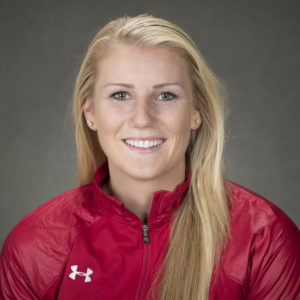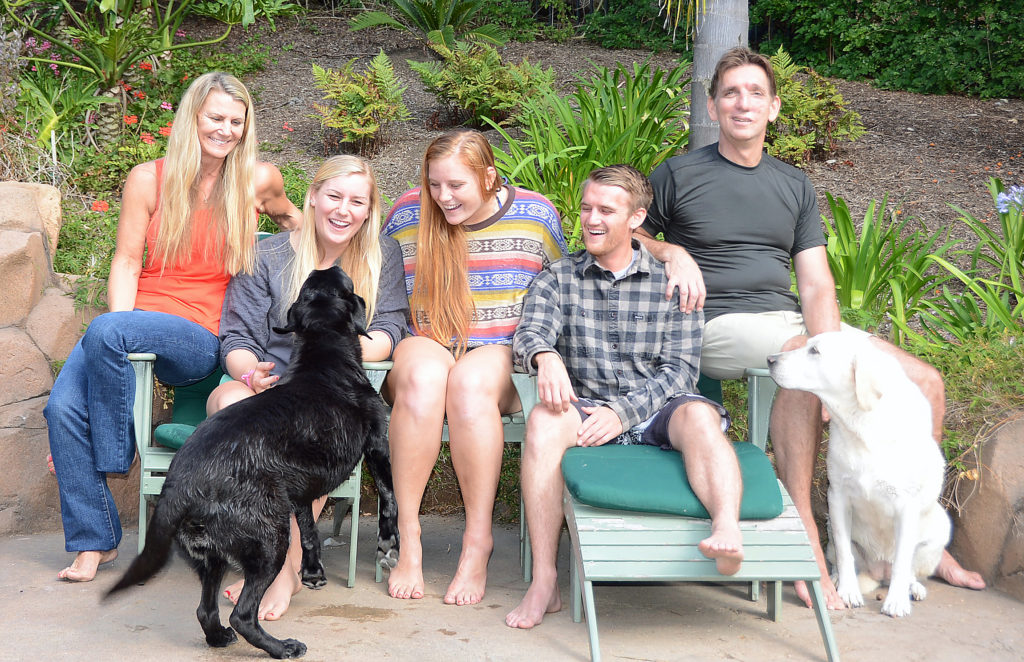
Wisconsin redshirt senior captain Annie Pankowski is standing outside the Badgers locker room, giving an interview to a handful of reporters, when a she gets distracted for a moment and then pauses her answer to lean down and scratch the head of a dog that’s now happily wagging its tail and sitting at her feet. Pankowski gives the dog a quiet command and then stands up to pick up exactly where she left off in giving an answer.
It’s a scene that has become familiar around the Wisconsin women’s hockey locker room the past few years as Pankowski has become involved with OccuPaws, an International Guide Dog Federation accredited in-home program that trains and places fully trained guide dogs with visually impaired Midwesterners at no charge. She has logged more than 2,000 hours training guide dogs and readying them for a life as a service animal. These days, it’s rare to see Pankowski without a dog by her side, so much so that she said her teammates often express disappointment when she shows up at the rink without a four-legged friend.
The daughter of two veterinarians, Pankowski has been around animals her entire life.
“Growing up, we had a ton of animals in the house,” she said. “My mom was really big on that community work. She always helped out with those cases that have issues and didn’t have owners. We ended up taking them home. That’s just kind of how our house was. It was full of cats and dogs that needed rehab or needed some place to stay while they recovered. That was just always a part of our life growing up.”
A native of Laguna Hills, California, Pankowski attended boarding school at North American Hockey Academy in Vermont for high school before choosing Wisconsin. She’s well used to being away from home, but she’s never quite gotten used to living without the comfort of a pet.
A self-described perfectionist, Pankowski can have a laser focus that’s both a boon and a hindrance. She has been one of the best women’s hockey players for years and this year was named a top-three finalist for the Patty Kazmaier Award, making her just the second-ever player to become both a Patty Kazmaier and Hockey Humanitarian finalist in the same season. She carries a 3.789 grade-point average while majoring in Zoology and has already decided she will continue her education at the University of Wisconsin veterinary school.
She said she has learned to embrace and harness her perfectionist tendencies while at college. A large part of that is understanding that when she feels overwhelmed, she needs somewhere to focus her energy that’s neither hockey nor academics.
“My mom has always been in my ear: ‘If you’re so stressed, what can you do for other people? What’s going to make you feel better?’” Pankowski said. “It’s never been that I need to pull myself deeper into hockey or I need to pull myself deeper into school. It’s always been, ‘Is there something else I can do for somebody else?’
“(OccuPaws is) something that filled me up outside of hockey or outside of school that never brings me stress. (Volunteering) is being part of something that’s bigger than yourself. It was important to me to make sure that I had that in my life. I’ve been (giving back) for so long that it was just kind of a missing piece when I didn’t have it. It just felt like it was something that I was capable of doing that I felt like I have the tools and the time and the environment to be helpful to them.”
Volunteering and giving back are something Pankowski said she has done from a young age. Her parents encouraged her and her siblings to give of themselves and be grateful for what they had. She started doing community service in elementary school, working in food kitchens and a therapeutic center for kids with disabilities and was hooked by the feeling of bringing joy to others’ lives.
Giving back and being of service are just a fundamental part of who Pankowski is, said Lauren Williams, Pankowski’s former roommate and teammate.
“I just don’t think that you can do everything that she was doing, all on top of Olympic training and simultaneously making great grades to get into Vet school, without that kind of helping mentality being ingrained into your being,” she said.
Pankowski doesn’t like talking about herself. She doesn’t see the service she does as work nor does she seem to feel that it deserves much recognition. Part of that is that she readily admits that she gets at least as much out of her time with OccuPaws as she has put in to it. Her time in puppy classes or training dogs one-on-one has kept her grounded, she said, reminding her of the life outside not just college, but outside hockey. She’s more comfortable putting her head down and getting to work than stopping to talk about it.
“She genuinely doesn’t recognize, I think, how amazing the things she does on a daily basis are. She just goes through her daily routines as if nothing is different than what anyone else is doing,” said Williams, who also got involved in the OccuPaws program through Pankowski’s influence. “The reality is, though, that I and so many others admired her work ethic and perseverance.”
Her freshman year, Pankowski was in the dorms and unable to have a pet. When she first signed up with OccuPaws, she said she was ignorant and naive to all that was involved. As she has advanced through her college career, she has picked up more responsibility with OccuPaws. Her very busy life is a great way for dogs to become accustomed to a wide variety of situations, from the loud atmosphere at a sold-out LaBahn Arena to the traffic in downtown Madison. Now, other than weekends the Badgers are traveling, she has a dog pretty much constantly.
It’s a massive undertaking that Pankowski takes in stride. As opposed to one-off events, she has signed up for a project that requires her attention all day, every day. But Williams said that it was never a chore and that Pankowski genuinely loved every single second of it. Her devotion to the dogs is really just a natural extension of Pankowski’s tendency to put as much of herself into what she’s doing as possible.
“She almost always has a dog, which is a huge commitment,” said Barb Schultze, President of OccuPaws. “To raise and train one of those dogs is hard, and she almost always has one and she does a terrific job with them. She’s fantastic with our dogs. She makes me jealous all the time of how accomplished she is. It’s truly amazing. And she does it nicely, with a truly a warm heart. She’s terrific.”
The dogs Pankowski trains eventually move on to be placed in homes with those who need them, something she said is the hardest and most rewarding part of the role. Seeing what a dog she has had a part in raising and training in action make the heartbreak less severe, she said. Although she’s always upset when it’s time for a dog to move on, she usually has a new puppy to care for and train and she just diverts her energy to her newest project. There are always more people who can benefit from the help of a trained dog, so there’s always more work to be done and that’s something Pankowski knows how to focus on.
Heading to the fourth Frozen Four of her career and having etched her name all over the Wisconsin women’s hockey record books, Pankowski’s on-ice legacy has been cemented. That a number of Badgers players are also working with OccuPaws and she has had players from other teams contact her about the possibility of getting involved shows that her impact goes far beyond the stat sheet.
